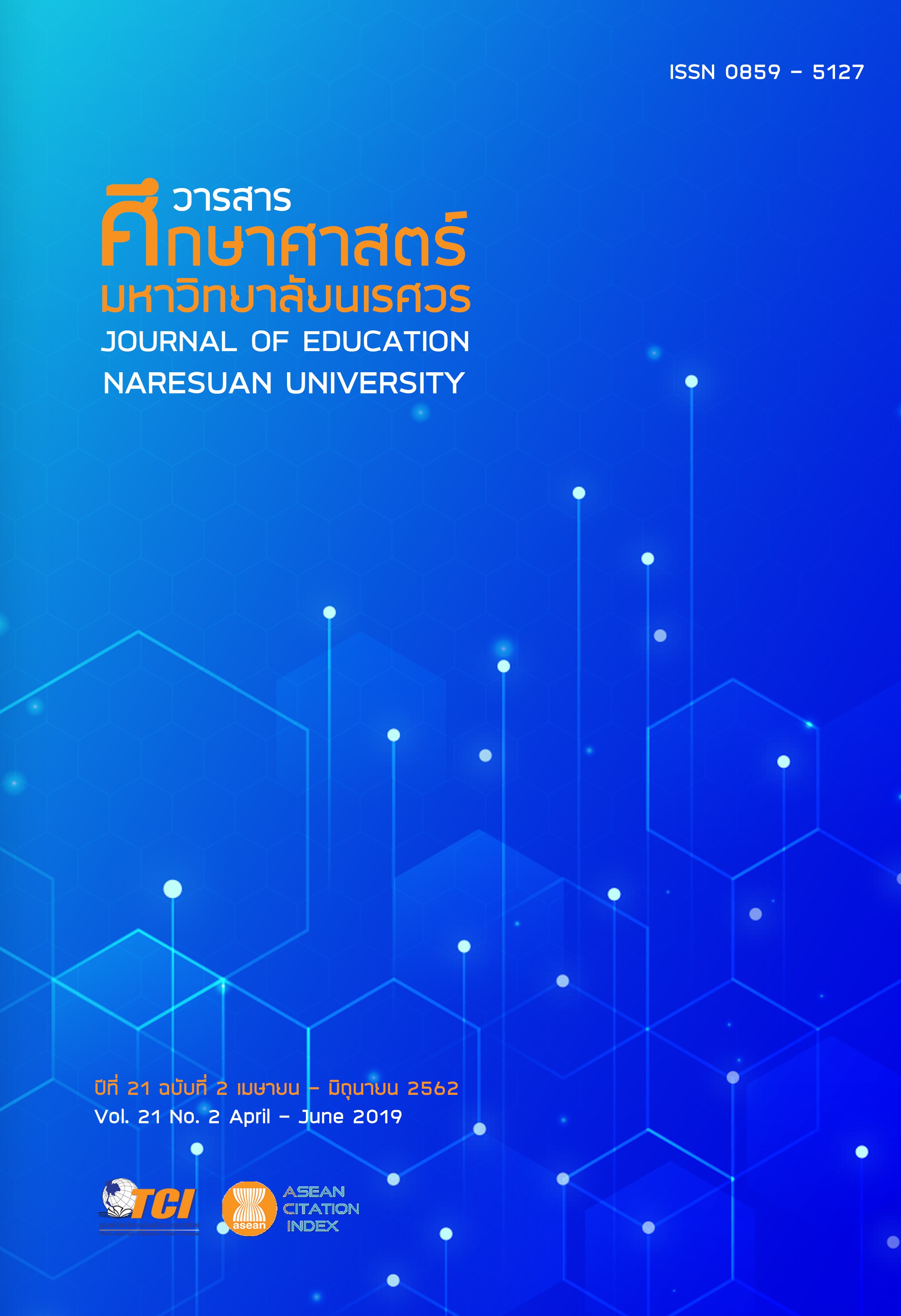ผลการใช้วัฏจักรการเรียนรู้ 7E ร่วมกับการสอนแบบสมององค์รวมที่ส่งผลต่อความมีวินัยในตนเอง จิตวิทยาศาสตร์และผลสัมฤทธิ์ทางการเรียน ของนักเรียนชั้นประถมศึกษาปีที่ 5 (EFFECTS OF 7E LEARNING CYCLE MODEL WITH WHOLE BRAIN TEACHING ON THE SELF-DISCIPLINE, SCIENTIFIC MIND AND LEARNING ACHIEVEMENT OF FIFTH GRADE STUDENTS)
Main Article Content
Abstract
การวิจัยครั้งนี้มีวัตถุประสงค์เพื่อ 1) เปรียบเทียบความมีวินัยในตนเอง จิตวิทยาศาสตร์และผลสัมฤทธิ์ทางการเรียนวิทยาศาสตร์หลังเรียนของนักเรียนกลุ่มที่ได้รับการสอนแบบวัฏจักรการเรียนรู้ 7E ร่วมกับการสอนแบบสมององค์รวม (กลุ่มทดลองที่ 1) กับนักเรียนกลุ่มที่ได้รับการสอนแบบวัฏจักรการเรียนรู้ 7E (กลุ่มทดลองที่ 2) 2) เปรียบเทียบความมีวินัยในตนเอง จิตวิทยาศาสตร์และผลสัมฤทธิ์ทางการเรียนวิทยาศาสตร์ก่อนและหลังเรียนของกลุ่มทดลองแต่ละกลุ่ม 3) เปรียบเทียบคะแนนจิตวิทยาศาสตร์หลังเรียนกับเกณฑ์ที่กำหนดของกลุ่มทดลองแต่ละกลุ่ม (มีคะแนนเฉลี่ยไม่น้อยกว่า 60 คะแนน) และ 4) เปรียบเทียบคะแนนผลสัมฤทธิ์ทางการเรียนวิทยาศาสตร์หลังเรียนกับเกณฑ์ร้อยละ 60 ของกลุ่มทดลองแต่ละกลุ่ม เครื่องมือที่ใช้ คือ 1) แผนการสอนของกลุ่มทดลองทั้ง
2 กลุ่ม 2) แบบวัดความมีวินัยในตนเอง 3) แบบวัดจิตวิทยาศาสตร์ และ 4) แบบทดสอบผลสัมฤทธิ์ทางการเรียนวิทยาศาสตร์ สถิติที่ใช้ทดสอบสมมติฐาน ได้แก่ สถิติ ANCOVA โดยใช้คะแนนความมีวินัยในตนเองก่อนเรียนเป็นตัวแปรร่วม One-way MANOVA, t-test for Dependent Samples และ t-test for One Sample ผลการวิจัย พบว่า
1. กลุ่มทดลองที่ 1 มีคะแนนเฉลี่ยความมีวินัยในตนเอง จิตวิทยาศาสตร์และผลสัมฤทธิ์ทางการเรียนวิทยาศาสตร์หลังเรียนไม่แตกต่างกับกลุ่มทดลองที่ 2
2. กลุ่มทดลองทั้ง 2 กลุ่ม ต่างมีคะแนนเฉลี่ยความมีวินัยในตนเองและผลสัมฤทธิ์ทางการเรียนวิทยาศาสตร์หลังเรียนสูงกว่าก่อนเรียนอย่างมีนัยสำคัญทางสถิติที่ระดับ.05 ส่วนคะแนนเฉลี่ยจิตวิทยาศาสตร์หลังเรียนไม่แตกต่างจากก่อนเรียน
3. กลุ่มทดลองทั้ง 2 กลุ่ม ต่างมีคะแนนเฉลี่ยจิตวิทยาศาสตร์หลังเรียนสูงกว่าเกณฑ์ที่กำหนดอย่างมีนัยสำคัญทางสถิติที่ระดับ.05
4. กลุ่มทดลองทั้ง 2 กลุ่ม ต่างมีคะแนนเฉลี่ยผลสัมฤทธิ์ทางการเรียนวิทยาศาสตร์หลังเรียนไม่สูงกว่าเกณฑ์ร้อยละ 60
EFFECTS OF 7E LEARNING CYCLE MODEL WITH WHOLE BRAIN TEACHING ON THE SELF-DISCIPLINE, SCIENTIFIC MIND AND LEARNING ACHIEVEMENT OF FIFTH GRADE STUDENTS
The purposes of this study were to compare 1) the posttest results on self-discipline, scientific mind, and science learning achievement on the group of students who received 7E Learning Cycle Model and Whole Brain Teaching (experimental group 1) with the group of students who received 7E Learning Cycle Model (experimental group 2), 2) the pretest and posttest results of self-discipline, scientific mind, and science learning achievement of the each experimental group, 3) the posttest scores of scientific mind with the defined criteria of each experimental group (not less than 60 points), and 4) the posttest scores of science learning achievement with the 60 percent criteria of each experimental group. Hypothesis testing utilized ANCOVA using pretest self-discipline scores as a covariate, one-way MANOVA, t-test for dependent samples, and t-test for one sample. The research results found that:
1. The average posttest scores for self-discipline, scientific mind and the science learning achievement of experimental group 1 did not differ from experimental group 2.
2. The average posttest scores for self-discipline and science learning achievement on both experimental groups are higher than the average pretest scores at a statistical significance of.05. Whereas the average pretest and posttest scores for scientific mind for both groups of students are not different.
3. The average posttest scores for scientific mind for both experimental groups are higher than the defined criteria at a statistical significance of .05.
4. The average posttest scores for science learning achievement for both experimental groups are not higher than the 60 percent criteria.
Article Details
The owner of the article does not copy or violate any of its copyright. If any copyright infringement occurs or prosecution, in any case, the Editorial Board is not involved in all the rights to the owner of the article to be performed.
References
2. ________. (2015a). Whole brain teaching seminar 1: Daily instruction and classroom management. Retrieved June 8, 2015, from https://www.static.kern.org/ gems/ci/WBTSeminar1ClassroomManageme.pdf
3. Eisenkraft, A. (2003). Expanding the 5E Model: A proposed 7E Model emphasizes “transfer of learning” and the importance of eliciting prior understanding. The Science Teacher, 70(6), 56-57.
4. Haemaprasith, S. (2000). Constructivism. In Encylopedia of Education. Bangkok: Faculty of Education, Srinakharinwirot University. [in Thai]
5. Kampradis, N. (2014). The development of science learning activities on solution by 7E Learning Cycle with brain based learning for Mathayomsuksa 1 students. Journal of Rampaipannee, 8(1), 68-75. [in Thai]
6. Lamkaew, S., Chaloeywares, N., & Phusumree, S. (2004). Comparison of learning achievement science process skills and science learning attitudes on electricity of Mathayomsuksa 3 students between using prediction observation explanation technique and 5E inquiry cycle. Journal of Education Naresuan University, 16(3), 190-199. [in Thai]
7. National Institute of Education Testing Service. (2017). O-NET. Retrieved April 4, 2017, form https://www.onetresult.niets.or.th/AnnouncementWeb\/Notice/FrBasicStat.aspx [in Thai]
8. Nurhasanah, L. (2013). Teaching specking ability using whole brain teaching method at junior level (young learners) students of “speak up” English course in Bandung: 2. Retrieved December 21, 2015, from https://www.google.co.th/url?sa=t&rct=j&q=&esrc=s&source= web&cd=1&ved=0ahUK
9. Palasigue, J. T. (2009). Integrating whole brain teaching strategies to create a more engaged learning environment. Retrieved June 3, 2015, from https://Files.eric.ed.gov/fulltext/ ED507407.pdf
10. Paugsuntear, S. (2010). Development of a scientific mind test for primary school student (Doctoral dissertation). Bangkok: Chulalongkorn University. [in Thai]
11. Pholkot, S. (2007). Comparisons of science process skills, learning achievement and scientific attitudes of Prathomsuksa 6 students learned using the 7E Learning Cycle Model and the 5E Learning Cycle Model with Assigned and Rotated Jobcards (Master thesis). Maha Sarakam: Mahasarakam University. [in Thai]
12. Pluemjai, T. (2016). Integrating 7E Learning Cycle Model and whole brain teaching for elementary science classroom. Retrieved March 24, 2017, from https://rdi.ssru.ac.th/conference2016/images/processing/proceeding% 20dec2016%20Ver2.pdf [in Thai]
13. Prathomwong, R. (2009). Comparisons of analytical thinking, science process skill and learning achievement of Phathomsuksa 6 students between organization 5E Learning Cycle Model and organization 7E Learning Cycle Model. Journal of Behavioral Science for Development, 1(1), 88. [in Thai]
14. Seehapanya, A. (2014). The effect of group investigation learning on science achievement and group work behavior of Matthayomsuksa 1 students at Chumchonbandanjak School in Nakhon Ratchasima Province. Retrieved February 4, 2017, form https://gsbooks.gs.kku.ac.th/58/the34th/pdf/HMP17.pdf [in Thai]
15. Silverstein, A. L. (2013). Experiences of teachers using whole brain teaching in their classrooms (Doctoral dissertation). Canada: Concordia University.
16. Sriworakul, L. (2011). Comparisons of learning achievement, basic science process attitude between the 7E Learning Cycle Model with metacognitive techniques and convention learning for Prathomsuksa 6 student (Master thesis). Maha Sarakam: Mahasarakam University. [in Thai]

